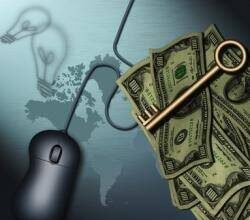A year ago, at a cover meeting at BusinessWeek, I proposed a big story: The Privacy Pay-off. The idea was that tracking and other data surveillance would spark a reaction: People would fear for their privacy. And this would create all sorts of business opportunities, the privacy pay-off.
A year ago, at a cover meeting at BusinessWeek, I proposed a big story: The Privacy Pay-off. The idea was that tracking and other data surveillance would spark a reaction: People would fear for their privacy. And this would create all sorts of business opportunities, the privacy pay-off.
It sounded like a plausible idea to the editors. So I went off hunting for companies cashing in on this expanding new market. I figured that certain advertisers would seek competitive advantage by offering privacy guarantees. I hoped that at least a couple would transform their privacy statements, changing them from unreadable legalese into a clear and compelling promise. Someone, somewhere had to be turning privacy statements into marketing tools.
I also talked to the research divisions of major tech companies. They had to be developing technology to help individuals manage and defend their privacy in a data-driven world.
Long story short: I did lots of research, and I never found the cover story. Sure, I picked up threads of it. EMC’s Mozy service, for example, offers cloud-based data storage with military-grade encryption. It costs more than, say, Google Docs. That’s the privacy premium. Researchers at Microsoft, HP and IBM were coming up with new filters and tools. I learned about data records that “aged,” vanishing after six months or a year. That Viagra receipt you might not want marketers to see would go poof. A hint of privacy pay-off? Perhaps.
This new market requires awareness, and feeds on fear. Last week’s Wall Street Journal series on privacy, which carried some provocative headlines, provides a dose of that. And now I see that others are pointing to the market potential for privacy. Jeff Jarvis agrees with me. Fred Wilson does too. Wilson, a VC, holds investments in Twitter, Foursquare, and other start-ups built on publicness (Jarvis’ word). And yet Wilson says:
“There are business opportunities in privacy-related services…The challenge is to get someone [whether business or consumer] to pay $2-$10 dollars per month to ensure that sort of premium privacy.”
As I researched my doomed story, I saw two mass-market data economies taking shape. One, the free economy (embodied by Google), provides users with near limitless services free of charge, and in return asks only for their data. It gains intelligence from that data, which supports its advertising business. The privacy policy in this free economy is simple: Trust us.
The second (and far smaller) data economy is built upon distrust. If you place your private data–your clickstream, your finances, health records, kids pictures, your location, social network–onto the networks, people will take advantage of you, harm you, spill your secrets, steal from you. So pay a privacy premium and stay safe. This is the policy companies have been following for decades, and now outfits like Mozy are offering these services to individuals.
I’m still grappling with the question of why the privacy payoff is taking so long to materialize. I think it has a lot to do with two basic factors. First, people tell pollsters they care about privacy. But they also like free stuff and hate to pay premiums, especially in a down economy. Second, despite all the fears about privacy, people have reason to share lots of their data. Far beyond gossip, there’s a value to it. It connects people to friends, answers, insights, business opportunities. For proof, look no further than the half billion folks on Facebook, or at Fred Wilson’s thriving portfolio. Even cookies serve a useful function. (Erase them and you’ll go crazy typing passwords to visit Web sites.)
Yes, I still believe the privacy pay-off will come. Turning privacy policies into marketing opportunities seems like a no-brainer. Smart filters will sell. But given the power of the free and public data economy, I suspect the privacy-wing will remain a niche market. In BusinessWeek lingo, a six-column story, not a cover.






